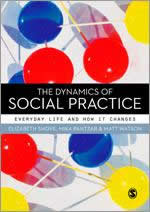Energy demand and social practices
Elizabeth Shove is Professor of Sociology at Lancaster University, whose research has focused on consumption, material culture and everyday practice, and on the ever evolving conventions of comfort, cleanliness and convenience.

She has authored and co-authored several books on related topics, including ‘The Dynamics of Social Practice: Everyday life and how it changes’; ‘Comfort, Cleanliness and Convenience’, ‘The Design of Everyday Life’ and ‘Infrastructures of Consumption.’
In recent years, Professor Shove has homed in on the question of how ordinary practices impact on energy demand and climate change. The idea that seemingly unrelated social arrangements such as the timing of school holidays, the details of what people wear or the renovation of office space are important for energy demand has only recently figured in policies and initiatives to reduce CO2 emissions.
Professor Shove’s prominence in her field, as well as the impact of her research means that she is held in high esteem as an academic, and is in demand for lectures and media appearances. Professor Shove has made numerous appearances on the radio, joining discussions including (but by no means limited to!) the social phenomena of drying clothes on BBC Radio 4’s ‘Woman’s Hour’, the shifts in standards and understandings of domestic hygiene on BBC Radio 4’s ‘Thinking Allowed’, climate change’s impact on suburban life on ABC RN’s ‘Life Matters’ and social habits in relation to climate change on ABC RN’s ‘By Design’.
As well this, Professor Shove’s research has been cited outside the world of academia, having garnered mainstream attention in print media, both nationally and internationally – her work has been discussed in the Daily Mail, The Guardian and The New York Times.
But what is it about her research that has led to its mainstream exposure and its policy influence? According to Professor Shove; “It deals with issues people are familiar with, like showering every day. In that sense, much of what matters for energy relates to a range of recognisable habits and ordinary routines. We’re using these topics to challenge common ways of thinking and to bring new strands of social theory into policy”.


